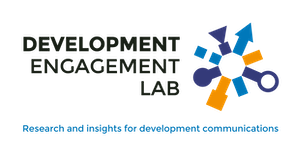On the occasion of International Women’s Rights Day, the Development Engagement Lab unveils the results of a comparative survey conducted by Yougov between February 20 and March 1st 2023 in Germany, France, the UK and the US.
Insights from language-testing
- There is no penalty from the public for including ‘addressing gender inequality’ in a list of aid policy priorities (‘Global health, climate and poverty reduction’ (vs. ‘Global health, climate and poverty reduction and addressing gender inequality) in terms of public support. Regardless of the inclusion of ‘gender,’ support for maintaining or increasing the aid budget when ‘addressing gender inequality’ is included ranges from 51% (Great Britain) to 71% (Germany).
- There is a penalty in Great Britain, Germany and the U.S. (not France) for attaching the word ‘feminist’ or ‘gender-inclusive’ to development policy, as in ‘Feminist Development Policy.’ This is compared to simply ‘Inclusive Development Policy’ or ‘Development Policy.’ When ‘feminist’ or ‘gender inclusive’ is attached, support for the policy drops by between 7- 15% in Great Britain, Germany and the United States, with no penalty in France.
- There is an even further penalty for not explaining gender-focused development policy : Drops in support for the policy range from 14% in France to 30% in Germany when there is no explanation offered with mentions of Feminist Development Policy or Gender-inclusive Development Policy. The lesson : Always explain the policy to the public.
- Still, it’s important to note that both a ‘Feminist Development Policy’ and ‘Gender-inclusive development policy’ capture majority support in all countries, with support at 55-60% when the policies are accompanied by an explanation.
- Almost 1 In 3 members of the public in Germany, Great Britain, France and the United States consider gender equality a voting issue, ranking it in the top two of actions they would be willing to take to encourage government to take action toward addressing gender inequality.
Insights on public support for gender and women & girls
- 1 in 2 people in Germany, France, Great Britain and the U.S. consider ending gender discrimination necessary to ending global poverty, and an even higher proportion (from 54% support in the U.S. to 75% support in France) believe ‘tackling gender inequality is morally the right thing to do.’
- Asked to identify the issues faced by women and girls, the public in Germany, Great Britain, France and the U.S. all identify sexual harassment, child marriage and female genital mutilation both as the issues they’re most aware of and believe should be addressed.
- Asked how to improve the lives of women and girls, the public in all four countries say education, followed by health and family planning. When asked about how to improve ‘gender equality’ (instead of ‘improving the lives of women and girls’), all choose education again, with a range of issues in second place including health, water, agriculture and others.
- Asked what action they would be willing to take to encourage their governments to tackle gender inequality in developing countries, the publics in Germany, France, Great Britain and the U.S. all put the following in the top three : ‘Sign a petition,’ ‘Vote for a candidate who supports gender equality,’ and ‘Boycott companies whose practices make gender inequality worse.’
-
The majority of the public in Germany, Great Britain, France and the United States blame religion and the roles of culture and history as the main barriers to gender equality in developing countries ; followed closely by ‘men’s resistance to change’. When asked about barriers in their own countries, Germany, France, Great Britain and the U.S. said culture and history first, then men’s resistance, though France also blamed a lack of laws that guarantee equality.
Press release : survey on the occasion of international women’s rights day
 Replier le menu
Replier le menu

